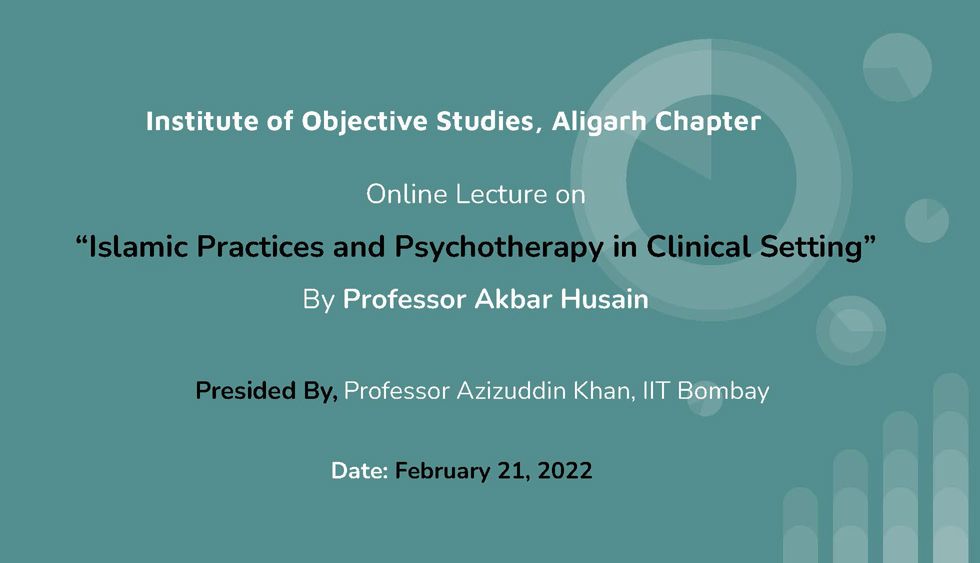IOS lecture on Islamic Practices and Psychotherapy in Clinical Setting

IOS lecture on Islamic Practices and Psychotherapy in Clinical Setting
Aligarh: The Institute of Objective Studies, Aligarh Chapter, organised an online lecture by Prof. Akbar Husain, Department of Psychology, Aligarh Muslim University, Aligarh on February 21, 2022, which was presided over by Professor Azizuddin Khan, IIT Bombay. Prof. Husain spoke on "Islamic Practices and Psychotherapy in Clinical Setting," which, as emphasised, is very much needed in the present-day scenario to provide bread and butter to psychologists and render the much-required services to society.
The event turned out to be a massive success, with more than 50 attendees getting apprised by one of the most eminent personalities in the realm of Islamic Psychology. Prof. Husain, in his address, very beautifully vocalized the role of Islamic Psychology and practices in the realm of the clinical setting. More explicitly, he started with a brief introduction to the emergence of Islamic Psychology as a specialty of Psychology of Religion and Spirituality, followed by the acclamation of the field by ardent researchers. He shed light on the surge of research work in Islamic Psychology, such as the development of Models on Islamic Psychological Constructs and ensuing empirical exploration of these models.
The lecture apprised the attendees about the role of Islamic beliefs, prayer, and zikr in alleviating a myriad of mental and physiological ailments. It further accentuated the role of Islamic psychology in begetting a distinct trend in Islamic psychotherapy and Quranic therapy in clinical practice. During his lecture, Prof. Husain discussed the empirical studies of the last three decades reviewed from eminent sources like PsycInfo, PubMed, Web of Sciences, Index Copernicus, Research Gate, SCOPUS, Semantic Scholar, SpringerLink, and Google.
The salient points of his lecture were as follows:
- The positive role of Islamic beliefs in self-health and societal-health behaviours, such as a positive attitude to organ donation and self-breast examination as a preventive action against cancer.
- The role of integration of Islamic principles and narratives with the process of traditional Cognitive Behavior Therapy (CBT) in the alleviation of trauma-related distress.
- Association of Islamic appraisal with curtailed Post-traumatic stress disorder (PTSD) symptoms post-trauma.
- The role of zikr therapy in the improvement of physiological measures such as visual analog, blood pressure, blood temperature, cerebral blood flow, galvanic response, and heart rate.
- The efficacy of Zikr therapy in the treatment of depression, general anxiety, and pre-operative anxiety among prospective surgery patients, especially with cancer, heart disease, obstetrical conditions, and orthopedic disease.
- The effectiveness of Islamic psychotherapy combined with conventional CBT in relieving panic attacks, agoraphobia, distress, and depression in cancer patients and post-partum depression in women.
- The role of Islamic forgiveness therapy in effectively managing the cases of marital issues by elevating adjustment and forgiving tendencies in married couples.
- The role of Islamic hope therapy and conventional hope therapy in alleviating depression and enhancing hope among Muslim patients suffering from coronary heart disease.
Over all, his lecture motivated the audience, especially the young enthusiast, to delve into the nuances of Islamic Psychology and leverage its bounties. The lecture by Prof. Husain lasted for one hour, with high interactions and colossal acclamation.
Go Back